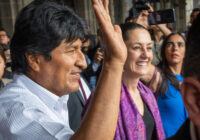On October 18, the Bolivian public went to the polls and elected Luis Arce Catacora as the country’s 67th president in a surprise result that returned the socialist party of former President Evo Morales to power. Morales had previously ruled Bolivia as the leader of the Movement Toward Socialism (MAS) between January 2006 and November 2019, when he resigned from office and fled the country under pressure from the military following a controversial general election.
The closeness of that contest — in which the conservative candidate Carlos Mesa missed forcing a runoff against Morales by 0.58% of the official vote tally — meant that 2020 was also expected to be a tight race. In the event, this year’s election saw Arce gain over half a million more votes than Morales had the previous year, with a similar amount bled away from Mesa’s 2019 total, handing Arce an outright victory without the need for a run-off.
Why Is Foreign Investment Flooding Into India?
While it would be tempting to see the Arce administration as a continuation of the Morales era, on the campaign trail, the new president repeatedly stated, “I am not Evo Morales.” Since being elected, Arce has made clear that Morales would have “no role” in his government. Nevertheless, with Arce serving as minister of economy and public finance for most of Morales’ tenure, any consideration of what to expect from the new president must take into account his predecessor’s record.
Business Under Morales
The Morales administration presided over a period of considerable economic growth and social development, which saw the rate of extreme poverty drop by more than half, from 48% in 2006 to 23% in 2018, while gross national income (GNI) per capita — a general indicator of prosperity among the population — more than tripled to reach $3,530 in 2019. GDP growth was also continuous and relatively consistent during this period, fluctuating between 3.4% and 6.8% until 2019, when it dipped to 2.2%. Those figures made Bolivia one of the fastest-growing countries in the region for much of Morales’ presidency.
These changes were partly the result of a policy of nationalizing the petroleum, telecommunications and mining industries, enacted by decree early in Morales’ first year in office and less than two years after 92% of Bolivian voters had supported the nationalization of hydrocarbons during a compulsory referendum. While the country’s revenues from hydrocarbons increased dramatically and provided the funds to support poverty alleviation programs, that approach did not lead to a dramatic fall in foreign direct investment (FDI) in oil and gas extraction or mining, as many expected. In fact, both industries saw significant increases in FDI, which subsequently declined again but never below the levels seen before Morales came into office. Throughout this time, it was Arce overseeing these programs and investment, as well as a process of agricultural development and rural land redistribution, which was followed by both a significant increase in cereal and fisheries production.
It is important to note that a major policy shift occurred toward the latter years of the administration, with Arce himself stating during Morales’ final term that “our nationalisation agenda is over. … we need FDI, and we respect genuine, new private investment. Today FDI makes up 2 percent to 3% of our GDP. We want to double that by 2020.” In 2017, the country signed deals with foreign investors for hydrocarbon exploitation worth $1.6 billion, supplemented by a further $2.5-billion deal the following year.
The fact that the interim presidency of Jeanine Añez, who occupied the office between Morales and Arce, largely coincided with the COVID-19 pandemic makes it incredibly difficult to properly assess its performance, given the massive economic upheaval experienced throughout the region. While the interim government ordered an audit of the previous administration early on, it was soon forced to focus on implementing a range of measures designed to address the closure of businesses and an increase in unemployment.
In October, the interim government reported that the economic damage caused by the pandemic totaled around $5 billion, with an economic contraction of at least 4% expected by the end of 2020. While this unprecedented situation might make an assessment of the interim government difficult, it at least provides some important context for Arce’s approach to business and investment, which will be framed by the need to address the deep economic wounds caused by the pandemic.
Arce’s Approach to Business
As a candidate, Arce highlighted the efficacy of the economic policies pursued during the Morales administration and his intention to continue them. While this has been met with concern among some commentators, the more FDI-friendly latter years under Morales should give some cause for hope for investment in the country. Arce has proposed a drive for industrialization to replace importing foreign products in order to stimulate the internal market and generate more opportunities for locally-based companies. He has also said that he wants to encourage new company formation in Bolivia in order to stimulate employment.
Yet Arce has also said that some form of austerity to deal with the country’s economic woes will be needed, even as he has pledged not to reduce public expenditure. In a sign of his pro-FDI approach, he has also highlighted his desire to tap into Bolivia’s massive and unexploited lithium reserves, at a time when demand for the mineral is skyrocketing in the face of the shift toward electric vehicles. Arce has stated that exploitation of those reserves will demand the help of a “strategic partner” and could pour an additional $2 billion into state coffers over the course of his five-year term.
With the economic uncertainty that continues to swirl due to the ongoing pandemic, it is difficult to draw concrete conclusions about what to expect from the Arce administration, given that it is impossible to know what challenges and obstacles may present themselves in the coming months or years. Nevertheless, his early moves have pointed to a clear desire to stimulate business, with measures taken to provide for deferred credit, refinancing and rescheduling of debts, as well as forbidding additional interest being added to such credit by banks.
What is abundantly clear is that Luis Arce understands how critical FDI is to Bolivia’s future development, and that understanding will surely only have deepened in the context of the economic turmoil that has traversed the globe. With Bolivia boasting a host of investment opportunities and unsaturated markets, and with the new president already highlighting his desire to bring foreign investment into Bolivia’s massive untapped lithium reserves, it seems reasonable to expect that his administration will pursue a significant deepening of FDI even while he maintains the high levels of social spending seen under Evo Morales.
The views expressed in this article are the author’s own and do not necessarily reflect Fair Observer’s editorial policy.
Support Fair Observer
We rely on your support for our independence, diversity and quality.
For more than 10 years, Fair Observer has been free, fair and independent. No billionaire owns us, no advertisers control us. We are a reader-supported nonprofit. Unlike many other publications, we keep our content free for readers regardless of where they live or whether they can afford to pay. We have no paywalls and no ads.
In the post-truth era of fake news, echo chambers and filter bubbles, we publish a plurality of perspectives from around the world. Anyone can publish with us, but everyone goes through a rigorous editorial process. So, you get fact-checked, well-reasoned content instead of noise.
We publish 2,500+ voices from 90+ countries. We also conduct education and training programs
on subjects ranging from digital media and journalism to writing and critical thinking. This
doesn’t come cheap. Servers, editors, trainers and web developers cost
money.
Please consider supporting us on a regular basis as a recurring donor or a
sustaining member.
Will you support FO’s journalism?
We rely on your support for our independence, diversity and quality.






